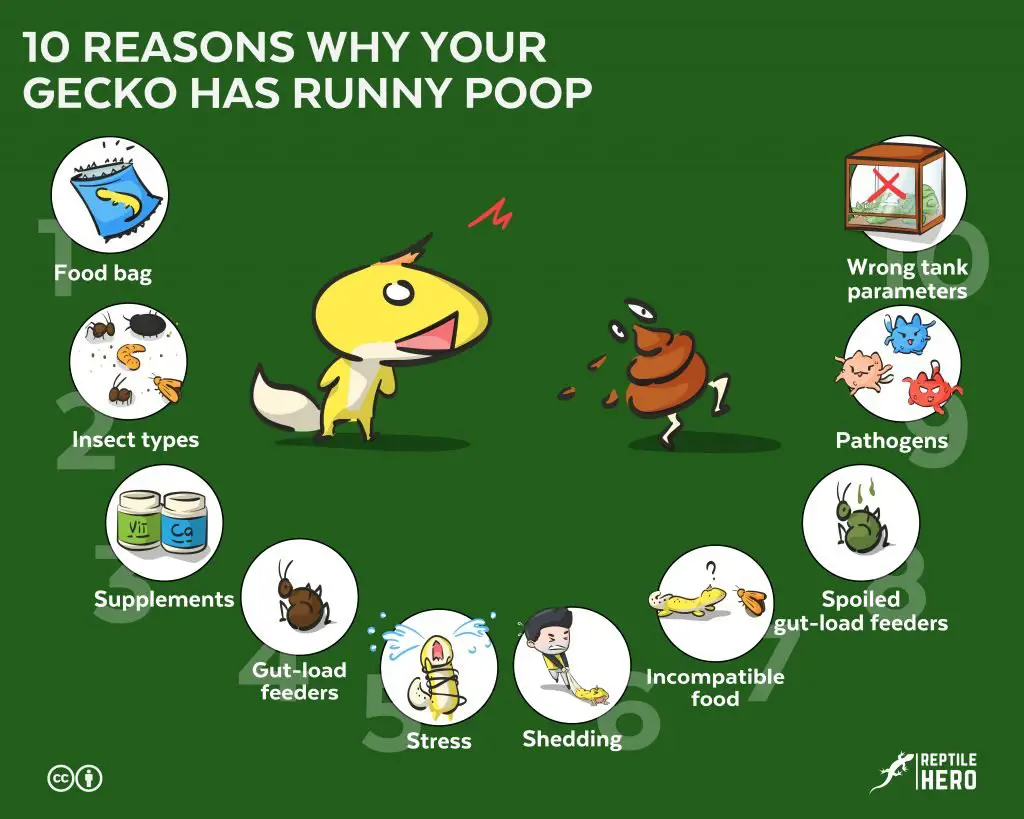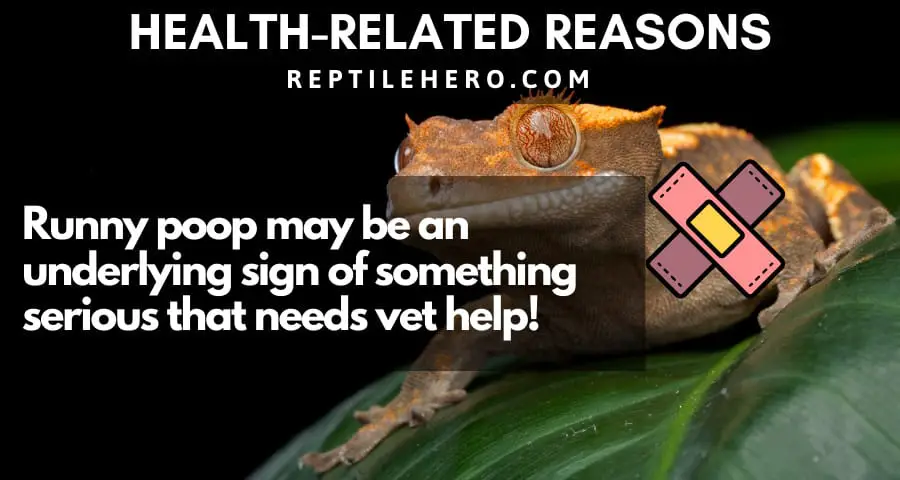10 Reasons Why Your Gecko Has Runny Poop
Geckos, differently from other pets, almost always poop on the same spot. But sometimes, this could come as a nasty surprise when you see runny poop! What could be the reason for the loose stool? How can you go about it?
Runny poop in leopard and crested geckos are mainly caused by changing the 1) food bag, 2) insect types, 3) supplements, and 4) gut-load feeders. Also, feeding 5) spoiled gut-load feeders or 6) incompatible food to the gecko diet can cause runny stool. Health-related reasons like 7) shedding, 8) wrong tank parameters, 9) stress, and 10) pathogens can also trigger runny poop in geckos.
Seeing a runny poop in your gecko’s tank is bothersome, so keep on reading to know the possible reasons why.
What Leopard and Crested Gecko Poop Looks Like
We often equate having an occasional runny poop (or loose stool) to diarrhea. However, that is not always the case. You—or your gecko—could only have diarrhea if you have runny poop at least three times a day.
Although you would often hear that a gecko has a black and white poop, there is actually more to a typical poop than that. Check the table below, which describes what your gecko’s normal poop should look like.
| Characteristics | Leopard and Crested Gecko |
|---|---|
| Number of Parts | 2 to 3 |
| First Part (Poop) | a light to dark brownwell-formed roll |
| Second Part (Urates) | a white or yellowishchalky drop |
| Third Part (Urine) | a clear or yellowish liquid(optional) |
| Consistency | solid, often sausage-looking |
| Form and Size | a rice grain or a coin |
| Presence of Undigested Insect Parts | minimal to none |
Frequently, you would not see the poop in its freshest form. So, some of its characteristics—like the color—may not adhere to what is written above. However, if the poop you are seeing does not fully resemble the description above, you should check these ten possible causes for its loose stool.
10 Main Reasons Why Geckos Have Runny Poop
On normal occasions, loose stool is not typical for a gecko. The two most common reasons for this to happen are related to 1) diet and 2) health.
Although leopard and crested geckos can survive harsh conditions in the wild, their stomachs can get a little too sensitive in captivity. If your leopard or crested gecko has runny poop, it could be a sign that something is amiss.
Depending on what is causing the issue, the loose stool can be resolved somewhat quickly by itself. Otherwise, a veterinary intervention should be heeded.

Diet
The type of food a gecko eats is quite often the cause of runny poop. Most of the time, loose stool associated with food is temporary and should sort out by itself. Otherwise, it might require some diet adjustments for it to resolve.
A few practical examples of diet changes that might trigger runny stool are:
- changing the food bag
- changing the supplements
- changing the kind of insects
- changing the gut-load of feeders
- feeding spoiled gut-load for feeders
- feeding undesirable foods
As a result, being aware of the more typical instances may help you prepare for a temporary runny poop from your gecko.
1 – Changing the Food Bag
Have you recently fed your crested gecko with a newly opened bag of crested gecko diet (CGD)? How about giving it a well-balanced homemade smoothie, a fruit, or an insect that it has not tried before?
Weird enough, even the most minor changes in a gecko diet—like feeding a freshly opened bag with the same brand and flavor or an edible snack—could soften a gecko’s poop.
Fortunately, this type of runny poop is temporary and should settle itself after a short adjustment period. So, you can expect your gecko’s poop to normalize after one to two feedings.
How to solve this kind of gecko runny poop?
Many of our gecko owner friends have reported success in avoiding loose stool by:
- Introducing snacks in small portions. When feeding new food, you can start by giving only a little of the snack—like a pea-size. If you observe your gecko’s poop to be back on the right track, you can give it as much as a small dish bowl the size of a plastic bottle’s cap (at most once a week).
- Transitioning by mixing the two diet bags. You can start with 80% from the old bag and 20% from the new bag on the first day. Observe how your gecko’s tummy reacts and work your way patiently until you feed it 100% of the new pack.
- Feeding bugs once or twice a week. Some gecko owners have advised that feeding bugs while introducing snacks or transitioning from an old bag to a new one can help harden runny poop.
2 – Changing the Type of Insect
In case you have recently shifted your leopard gecko from one kind of feeder insect to another, this transition could be the cause of your gecko’s runny poop.
For instance, the limited supply of Dubia roaches might have pushed you to switch and buy crickets. Or the high-fat content in waxworms is hurting your gecko, so you opted for hornworms instead. Either way, both changes affect your gecko’s sensitive tummy in some ways. Aside from possible vomiting, it could lead to runny poop.
However, you should not worry as this is not permanent. After giving your gecko time to adjust (say two to three feedings), it should pass and be back to normal. Otherwise, take the stool for fecal analysis in your veterinarian’s clinic.
3 – Changing the Supplements
Did you recently buy a different brand of calcium and multivitamin supplements? If yes, the new supplement brand could be the culprit of your gecko’s runny poop of varying colors.
Although it may sound unlikely, a few of my leopard and crested gecko owner friends have raised this concern to me. Mixing of different supplement brands is never advised, and it should never be done. So, they told me that they just waited until their geckos defecated normally, usually within two to three days.
4 – Changing the Gut-load of Feeders
Changing the gut-load of the feeder insects has a similar effect to your leopard gecko as switching from one type of bug to another.
Other owners may have overlooked this idea. After all, it sounds absurd since the process may have little to no effect on the gecko. However, you have to remember this. What you gut-load your insects are digested and absorbed by your gecko. That is why it is crucial to appropriately gut-load the feeders to your gecko’s nutritional needs.
How to solve this kind of gecko runny poop?
To lessen your chance of dealing with runny poop caused by this reason, we suggest incorporating the insects with a new gut-load in trenches.
- Add one or two of these insects to the others that are gut-loaded with the usual.
- Feed these insects and observe the poop of your gecko.
- Increase the number of insects with the new gut-load while observing its poop.
- Do this until you are feeding it with insects that have eaten the new gut-load.
5 – Feeding Spoiled Gut-Load to Feeders
Feeding spoiled gut-load to feeder insects can cause leopard and crested geckos stomach discomforts, resulting in runny poop.
Just as eating rotting food can leave a troubled tummy, your leopard or crested gecko could be defecating loose stool because of the stale meal its feeders have ingested. Apart from giving nutritional food to the feeders, you also have to ensure that you feed them with fresh gut-load. This should solve your gecko’s runny poop after one to two feedings.
6 – Feeding Undesirable Food
Due to their need for a varied diet, crested geckos are frequently fed with undesirable food that may cause runny poop. Among the list of seemingly healthy food that many owners give their geckos are:
- Baby food. Although this is healthy and safe for human consumption, baby food is not suitable for geckos. In fact, it is known to cause loose stool. Not only that, but it also has a mismatch of nutrients to what your gecko’s body requires. So, feeding it is never recommended.
- Fruits high in fiber. Fruits like apples, bananas, and raspberries are great occasional treats for geckos. However, feeding too much and too often of these fruits rich in fiber may harm their tummy, resulting in runny poop.
- Fruits high in fructose. Fruits like cherries, peaches, and pears are typical examples of fructose-rich fruits that you should offer less even as treats to your geckos. When offering them these treats, you should anticipate loose stool.
- Spoiled food. Some owners might have overlooked that CGDs and smoothie snacks spoil in a span of a few hours. Generally, most owners leave the food inside the tank for about an hour to avoid spoilage.
Having a well-balanced diet means a healthy crested gecko. Nevertheless, even if fruits are rich in nutrients, they may cause an adverse reaction to your gecko’s tummy.
If you notice runny poop while giving this food as treats, you should cut them out and observe if your gecko’s poop would be back to normal. Otherwise, you would have to check for other possible reasons below.

Health
A number of health-related reasons may cause runny poop in geckos. Frequently, these can get very serious, leaving geckos with a weakened immune system. Such conditions require expert help from an exotic veterinarian.
A weakened immune system can be manifested from a multitude of red flags. The following health-related reasons are typically pointed out by many gecko owners:
- shedding
- improper tank parameters
- stress
- pathogens
Loose stool caused by compromised health should revert to its typical appearance once you adequately address the underlying causes. Otherwise, runny poop could be the least of your concerns when prolonged and neglected since complications may arise.
7 – Shedding
A temporary and harmless health-related reason that may cause geckos to have runny poop is their seasonal shedding, which is entirely normal.
Not only would the poop be runny, but the stool itself would be gray to white in color as a result of eating their shed skin. So, do not confuse this with the urates at the tip of the poop. Fortunately, this should go away one to three days after your gecko has fully shed off its skin.
On another note, some gecko owners still house their pets on sand or other loose substrates. Be reminded that this is never recommended as the geckos can ingest the tiny particles, which causes impaction or loose white stool. Change the substrate immediately.
8 – Improper Tank Parameters
| Parameter | Leopard Geckos | Crested Geckos |
|---|---|---|
| Humidity | below 50% | between 60% to 80% |
| Temperature | between 78°F to 95°F | between 68°F to 82°F |
- High humidity: As many owners have observed, humidity levels kept at above 40% for leopard geckos and above 70% for crested geckos for an extended period could cause loose stool.
- Low temperature: Some owners told me that temperature readings lower than 78°F for leopard geckos and 68°F for crested geckos result in runny poop and indigestion.
9 – Stress
Although leopard and crested geckos are hardy and resilient pets, they can still be undoubtedly stressed over things and situations. Eight typical instances that can provoke stress in geckos are:
- Changing environment: Travelling to a new home is never not stressful for geckos. The runny poop it accompanies usually lasts even after two weeks into your care. However, this should resolve by itself after it has fully adjusted and acclimated.
- Changing tank: For geckos, moving to a bigger tank is similar to moving to a new home—full of stress! Likewise, the loose stool should pass by in a week or so, given that your gecko is healthy.
- Improper handling: Handling your gecko the way it should not be is stressful and puts its health at risk. So, you should be mindful to properly hold your reptile at all times.
- Too much handling: Being handled when they do not feel like it is stressful for geckos. Thus, hold them when they are fully awake—when nighttime comes—and never when they are resting during the day.
- Lack of hides: The lack of coverings in the form of plants, woods, and other accessories can lower the sense of security in geckos. Hence, adding more appropriate hides can help them feel safe and at ease in their home.
- Poor hygiene: Aside from triggering stress in geckos, poor hygiene of their tank can also serve as a breeding ground for lurking pathogens that can worsen the runny poop. Following a spot-on and general sanitation schedule should resolve and prevent future incidents of loose stool.
- Bullying by tankmates: Some owners practice cohabitation of female geckos (it should be avoided at all cost), which can lead to bullying. The bullied gecko may suffer stress apart from physical traumas. Individual habitation should solve the runny poop when it is observed.
- Presence of excess feeders: Leaving too many feeder insects may not be as practical as you think it would be since the leftover bugs can actually stress your gecko. So, you must feed only what your gecko can consume in about 5 to 15 minutes and remove all excess at once.
10 – Pathogens
Pathogens can cause runny poop. If left untreated, they can seriously affect leopard and crested geckos, leading to further complications. A prompt veterinary visit is required.
Different pathogens—including bacteria, fungi, parasites, and viruses—can trigger runny poop in geckos. Bacteria, fungi, and viruses are the less common ones you would suspect. Meanwhile, parasites are the most notorious culprits, though they could be more challenging to diagnose.
Among the many pathogenic parasites, Cryptosporidium, Entamoeba (potentially infectious to humans), and Pinworms are likely to cause runny poop. Often, other signs accompany loose stool over the course of the week, such as [1]:
- changes in behavior
- changes in eating habits
- loss of appetite
- loss of weight
If you suspect that pathogens are the root cause of your gecko’s loose stool, immediately book an appointment with your herp veterinarian for a complete fecal examination and other necessary tests.
Before the appointment day, you may want to do the following:
- Collect a stool sample using a (sterile) spoon.
- Place it inside a clean storage bag or Ziploc.
- Refrigerate it until you leave for the clinic.
In the event that your gecko tests positive for parasitic infection, it would undergo a proper and crucial treatment. Normally, the process necessitates it to move in a hospital tank with a paper towel substrate and a tiptop clean enclosure.

6 Ways to Prevent Runny Poop
Here are six ways you can prevent dealing with runny poop in geckos:
- Feed only proper and healthy food.
- Follow a spot-on and general cleaning schedule of the enclosure.
- Keep track of tank conditions, especially temperature and humidity.
- Maintain a tidy tank to eliminate the breeding grounds of pathogens.
- Observe the correct doses of vitamins and supplements.
- Provide a clean bowl filled with water for hydration.
Caring for your gecko does not only entail that you should be careful alone. Instead, you should also be mindful and knowledgeable about what you give and provide your pets.
While runny poop in itself is treatable, you should instill that the old saying ‘prevention is better than cure’ always holds true.
Takeaways
A normal gecko poop is solid and well-formed. It should have at least three distinct parts: light to dark brown poop, a chalky drop of urates, and an optional clear to yellowish urine.
Runny poop in geckos is an atypical occurrence, although it passes by itself most of the time. Generally, two main reasons are causes of loose stool: diet and health-related problems.
Runny poop in itself is not lethal for geckos, and the root causes are treatable. However, prevention is always advised to gecko owners in order to avoid unwanted complications that may arise.
Sources
[1] https://www.reptilesmagazine.com/lizard-with-soft-stool/

![Why Do Leopard Geckos Poop in the Same Spot? [Wild Nature]](https://www.reptilehero.com/wp-content/uploads/2022/03/why-geckos-poop-in-one-spot-cc-1-768x614.jpg)

![Do Geckos Fart? [4 Potential Reasons]](https://www.reptilehero.com/wp-content/uploads/2021/05/why-geckos-fart-cc-768x614.jpg)


